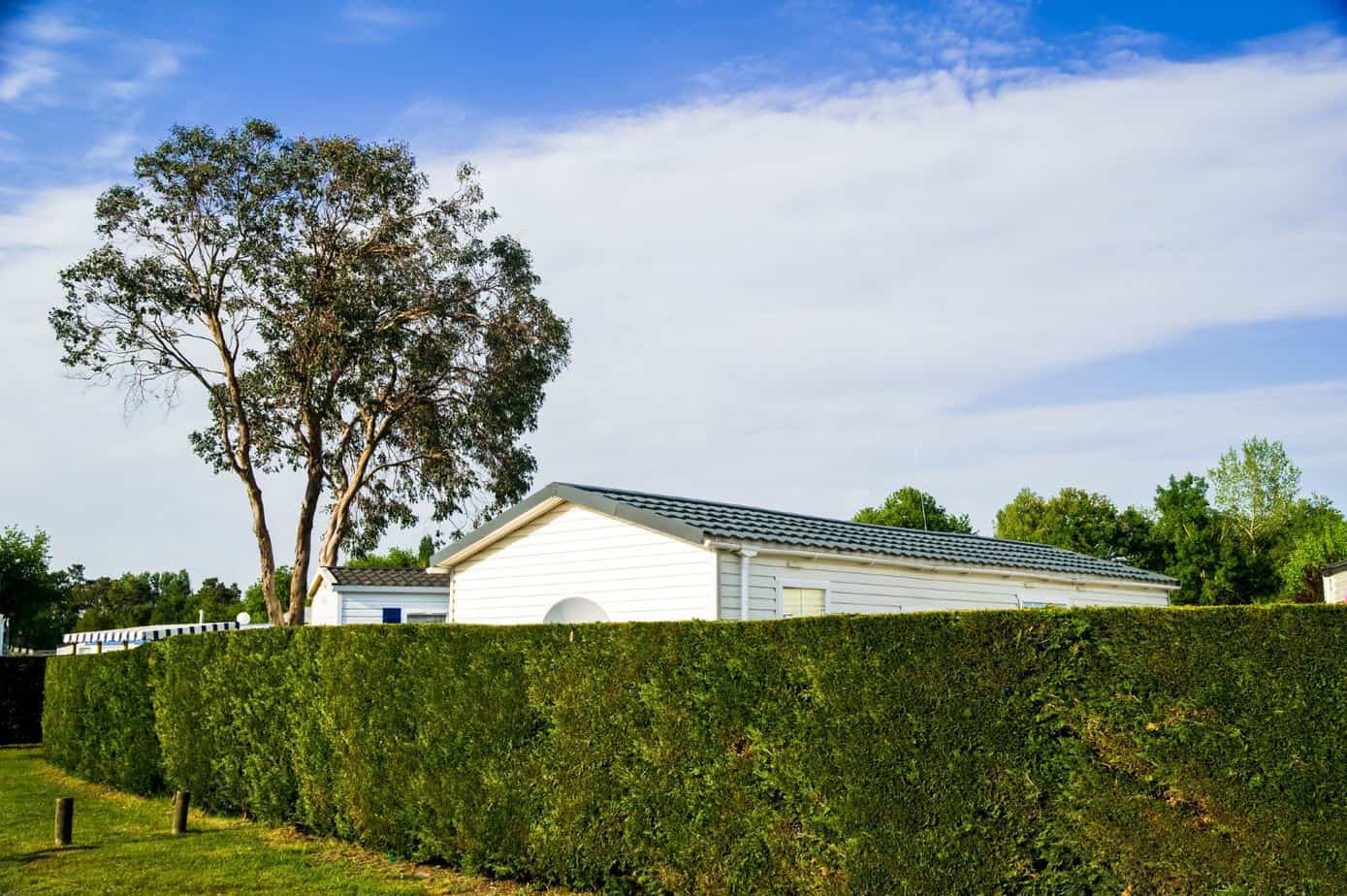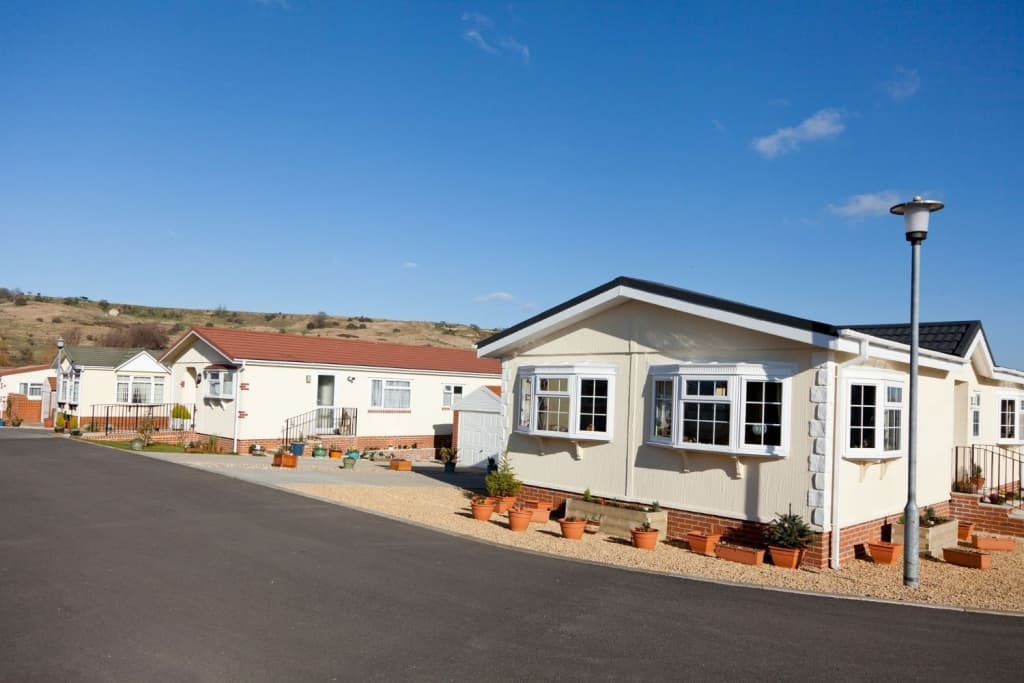Are you thinking about living in a static caravan and wondering if it’s possible to do so all year round?
The short answer is yes; it is possible to live in a static caravan for 12 months of the year, but only in certain situations.
In the UK, at the time of writing, someone can live in a static caravan year-round;
- On privately owned land subject to planning permission
- On a residential caravan park
Read on to learn more about living in a static caravan in the UK.

Understanding Static Caravan Living
Living in a static caravan offers a unique blend of flexibility and convenience, but there are also specific challenges you’ll need to consider.
Benefits of Static Caravan Lifestyle
- Affordability: The cost of living in a static caravan can be significantly lower than in a traditional home.
- Locations: You have the possibility to live in picturesque locations, often with access to nature and tranquillity.
- Community: Many residential caravan sites provide a sense of community with like-minded individuals.
- Amenities: High-end caravan sites offer luxury amenities that might be unaffordable in a conventional brick and mortar house.
- Lifestyle: Depending on the park, it can feel like you’re on a year-round holiday.
Challenges of Static Caravan Living
- Depreciation: Unlike houses, static caravans lose value over time.
- Residency Restrictions: Depending on the caravan park and local regulations, you may face restrictions on year-round living.
- Space: Living space is more limited than in a traditional house, so downsizing and organisation are essential.
- Maintenance: Although lower than houses, maintenance is still necessary to keep your caravan in good condition.

Legal and Regulatory Considerations
Navigating the legal landscape is essential when considering living in a static caravan. You need to be aware of planning laws, residential rights, and the implications for insurance and liability.
Planning Permission and Regulations
If you’re setting up a static caravan on your own land, you are required to obtain planning permission from your local council. This ensures your living arrangement complies with local land use plans and building regulations. Different rules apply for caravans in holiday parks, as park owners typically have planning permission for the entire site.
Residential vs Holiday Park
Residential parks are specifically licensed for people looking to buy and live in a static caravan, or ‘park home’ as their main dwelling all year round. You won’t typically find holiday guests at residential parks, only those that live there.
Holiday parks are not permitted to allow owners to stay on the park all year round, even if they are open for 12 months of the year. Each holiday park will have different rules on the length of stay permitted for owners, but you will be required to prove you have a permanent address elsewhere.
Insurance and Liability Issues
Securing insurance for a static caravan is necessary to protect your home and belongings against risks such as damage or theft. Also, verify that your liability coverage is adequate, as you may be responsible for accidents that occur within your caravan or its vicinity. Ensure that all insurance policies are valid and meet the mandated standards for static caravan residences.
Practical Aspects of Daily Life
In a static caravan, your daily life includes managing utilities efficiently and maximising your living space through clever storage solutions.
Utilities and Maintenance
Electricity and Gas: You’ll typically be connected to mains electricity and gas. It’s important to keep an eye on energy usage, as caravans are less insulated than houses. Schedule regular maintenance checks for your heating systems to ensure safety and efficiency.
Water and Waste: Your water supply may come directly from a mains connection. For wastewater, you have either a connection to the local sewage system or a septic tank, which will need periodic emptying by professionals.
Maintenance: Regular upkeep is essential to prevent dampness and mould, which are common issues in caravans. Check seals around windows and doors frequently, and inspect the exterior for any signs of damage that could lead to leaks.
Space Optimisation and Storage Solutions
Designing Your Layout:
- Use multi-functional furniture, such as a bed with drawers.
- Install wall-mounted shelving to free up floor space.
- Consider a fold-away table or a breakfast bar that utilises window sills.
Storage Tips:
- Invest in vacuum-seal bags for clothing and bedding.
- Use the vertical space: high shelves for items you don’t use daily.
- Keep your space clutter-free by staying organised with labelled containers.
Community and Social Life
When you choose to live in a static caravan, your social landscape often changes significantly. You’ll find unique opportunities for community involvement and new ways to access local facilities.
Integration into the Caravan Community
In static caravan parks, you are likely to encounter a tight-knit community. Residents often share common interests, particularly love for the less hectic lifestyle that caravan living affords. Here’s what you can expect:
Benefits:
- Frequent Social Events: Caravan parks often host events like BBQs, game nights, and specialised clubs.
- Community Support: You can rely on a network of neighbours for help and companionship.
Tips for Integration:
- Take the initiative to attend community gatherings.
- Be open to forming connections; close-knit circles are common.
Access to Local Amenities and Services
Static caravan sites are typically well-connected to essential services, ensuring you have access to everything you need.
Local Amenities Include:
- Shopping Centres: Often within easy driving distance.
- Healthcare Services: GP surgeries and pharmacies are usually accessible.
Service Access:
- On-Site Facilities: Depending on the site, you might have laundry, waste disposal, and even local shops available.
- Public Transport: If you don’t drive, check if the site is near local bus or train services.
Financial Implications
When considering living in a static caravan, you must understand the various financial obligations and implications.
Costs and Budgeting
Your budgeting for static caravan living must account for several expenses.
Initial Purchase: A static caravan can cost significantly and vary based on age, condition, and location.
Site Fees: According to Lease Park Homes, pitch fees can be in the region of £60 to over £200 a month to cover rent for your caravan’s plot.
Utilities: Additionally, you must budget for utilities, including gas, electricity, and water.
Depreciation: your caravan will reduce in value over time, often noticeably so within the first five years.
Transport and Pitch Fees: Transportation costs apply if you need to move your caravan.
Maintenance: remember to account for interior decorating and maintenance costs to keep your living space up to standard.
- Initial Purchase: Variable
- Site fees: ~£60 to £200/month
- Utilities: Gas, electricity, water
- Depreciation: Significant in the first 5 years
- Transport and Pitch Fees: As required
- Decorating and Maintenance: Variable
Depreciation
When purchasing a static caravan, don’t consider it an investment as you would with a traditional brick and mortar home. The depreciation rate is often around £5,000 per annum for illustration purposes.
Where To Buy A Park Home
Park homes for year round living regularly come up for sale. With residential parks in every part of the country, you’ll have your pick of locations.
To find the latest park homes for sale, check the following places:
- Local estate agents: register with estate agents in the areas you are interested in, or begin looking on Rightmove to get an idea of prices.
- Listing directories: various directory sites list the latest park homes for sale. Try Park Home Living.
- Contact the park: if you have a park or two in mind that you would like to potential live on, give them a call to arrange a visit and see what park homes they have for sale.

